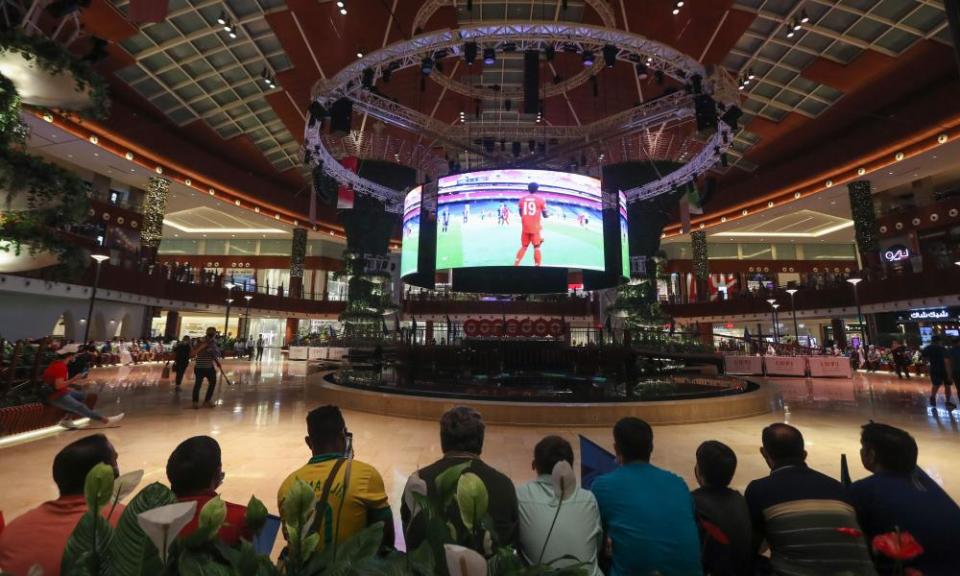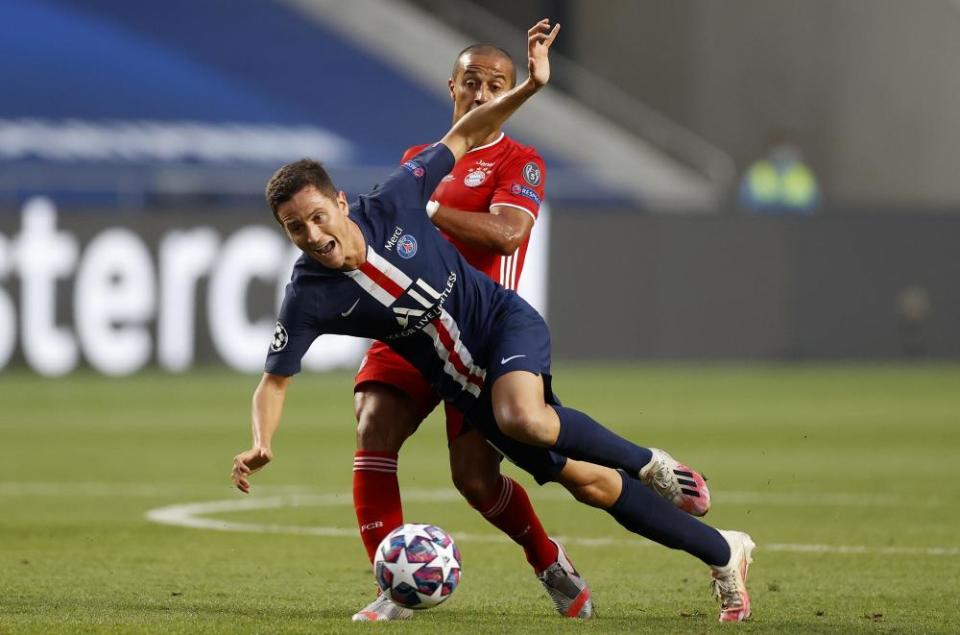For PSG this final defeat signals a dream not ended but deferred
Football, or that part of it that professes to have a conscience, breathed a huge sigh of relief but as it did so, some still small voice perhaps niggled. The only goal of the Champions League final was scored by Kingsley Coman, a player convicted in 2017 of twice assaulting the mother of his child.
The game was won by Bayern Munich, the swaggering superclub whose eight straight league titles means they have won more Bundesligas than the rest of Germany put together. Since 2011, they have regularly trained in Qatar, an emirate with a highly questionable human rights record, and in 2018 they signed a sponsorship deal with its state-owned airline. And somehow, their win represented a victory for the good guys.
Related: Thomas Müller shows PSG's A-list attacking unit how to be a winner | Barney Ronay
At least, though, it wasn’t a victory for Paris Saint-Germain, a club owned by Qatar. It wasn’t, yet, an all-out victory for sportswashing. As states use football as an arm of foreign policy, the reality of what the sport is being used to occlude should never be forgotten.
Although there have been much-trumpeted reforms of labour laws, how much practical change there has been is debatable. The kafala system of visa sponsorship, which effectively gives employers the power to prevent their workers changing jobs or leaving the country, remains in place for those in the military, public and domestic sectors. Qatar has persistently refused to reveal how many migrant workers have died during the construction of World Cup stadiums.
Qatar may be more liberal than many other Gulf states, but women’s rights remain severely restricted. Women can marry only with the express consent of a male guardian, only men have unilateral right of divorce, female siblings get half the inheritance their brothers get and domestic violence and marital rape are not criminalised. Homosexuality remains a crime. In 2018, the Doha edition of the New York Times featured nine blank pages where reports on gay and transgender rights had been excised.

In terms of the success of the sportswashing project, it may not matter that PSG lost. While the Emir, Sheikh Tamim bin Hamad al-Thani, would no doubt like to pose with the cup, it’s probably not necessary. The club president, Nasser al-Khelaifi, said after the semi-final victory that since the takeover in 2011 “the Champions League has been our dream”, but when Qatari Sports Investment bought the club its stated goal was more modest: to have “a great team and a strong brand on the international scene”.
It certainly has that; and if it was going to lose to anybody in the final, it may as well be another club with Qatari links – so much that Qatar Airlines could promote the final as the “Qlassico”. Sunday was a great day for club-branded retail outlets at Doha’s Hamad International Airport.
PSG are not going away. They remain one of European football’s mega-brands. They will be there if the expanded Club World Cup manages to find itself a slot in the increasing crowded calendar (and Fifa will have been heartened as it looks to establish that tournament by the success of the World Cup-style format over the past fortnight). If a super league is ever established, they will be a part of it.
For those super-clubs, the nature of the modern Champions League is a little like pass-the-parcel. Sooner or later there will be a season when there is no side obviously better than the others, or when that side suffer ill-fortune at a key moment, and when that happens being there is enough: sooner or later the music will stop with the prize in their hands. PSG aren’t going to stop being invited to the party any time soon.
But this is about more than wealth. In two years under Thomas Tuchel, there has been a clear evolution. It’s not wrong to look at the £1bn expenditure on transfer fees alone and wonder whether the heap of devalued domestic silverware was worth it, but the side that lost to Bayern on Sunday were a world away from the rabble that lost 3-2 at Anfield last season.
There was organisation and structure – and, vitally, no passengers. The gulf that sometimes appears between the forward line and the midfield was not apparent. Had PSG scored one of the four highly presentable chances they created in the first half, they might easily have won and, for all that Bayern had 61.6% possession, it would not have been a smash and grab.
Neymar remains the centrepiece of the project. He has seemed notably more mature this season and had a decisive influence in both quarter- and semi-finals. He has become one of those issue players about whom debate is soon lost in the froth of the backlash against the backlash against the backlash so the discussion becomes about the discussion rather than about his performances. He is a superstar footballer yet a pawn of Qatari foreign policy and an icon of patriotic Brazilian expectation and that must bring intolerable pressure.
There was one extravagant scream and writhe, and a classic late booking for a petulant foul, sure signs of a game going against him, but most significant, perhaps, was that for all his effort, all his defensive running, Neymar didn’t make a single successful tackle or interception. It’s perhaps not an entirely fair comparison given Bayern are probably the best pressing side in the world, but Thomas Müller regained possession more than the PSG front three put together.
And again, perhaps, it’s reasonable to wonder whether given PSG’s enormous advantages over the rest of Ligue Un, and their consequent lack of practice against teams with any hope of challenging them, that pressing from the front can ever be improved. The result was to increase the pressure on the midfield and it’s no coincidence that Leandro Paredes and Ander Herrera, exhausted as Bayern began to exert control in the second half, were the first to be withdrawn.

What really cost PSG, though, was the departure of Thomas Meunier for Borussia Dortmund at the end of the domestic season, which exposed the relatively inexperienced Thilo Kehrer to the runs of Coman. When Tuchel spoke of further investment, full-back surely is an area that will be prioritised.
For PSG, of course, even amid a pandemic there is plenty of money for further signings. The wealth of Qatar is not quite infinite, but it is more than enough for funds to remain available as more traditional revenue streams dry up. The superclubs will continue to dominate, and those with the might of states behind them are less susceptible to the changing winds of the sports finances than the rest. For PSG, Sunday’s defeat was a dream not ended but deferred.
The superclub era goes on. Sportswashing endures.

 Yahoo Sport
Yahoo Sport 





































